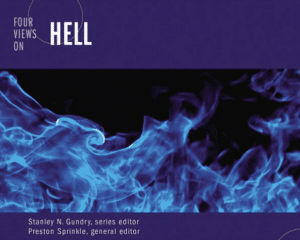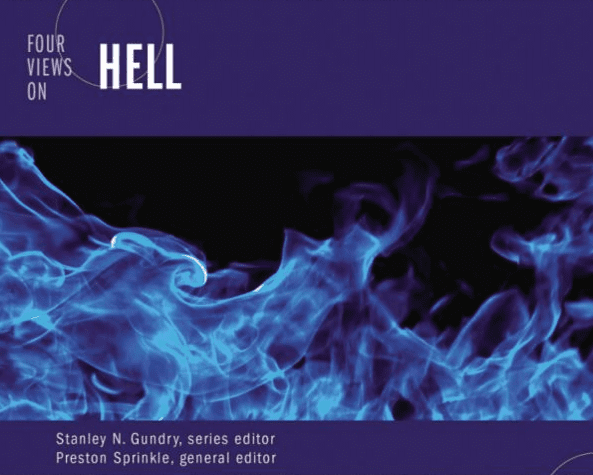Having read all four views of hell in Zondervan’s second edition of the book, I find myself drawn to John G. Stackhouse’s view: terminal punishment. Stackhouse expands this to mean that after unrepentant sinners are punished for their sins, they will cease to exist. Having refused Jesus’ atoning work, they must make atonement for themselves. After they do, they die. They cease to be. Stackhouse argues that the biblical term “die” cannot mean “not die,” i.e., made to mean to live eternally and consciously in torment.
Stackhouse tackles the key words ‘olām and aiônios (eternal, everlasting) and shows that the terms do not have to mean living eternally in either paradise or punishment. But wait, does that mean eternal life is not “eternal”? Stackhouse argues that eternal life for Christians does not hinge on the word “eternal” but on being in union with Christ the Eternal One Who paid the full debt (atoned) for our sins (77).
Terminal punishment’s foundation. Surveying the terms “destroy,” “death,” “ruin’ (apollunai) and citing Edward Fudge, Stackhouse writes, “…[these terms] speak of the destiny of the lost as termination, end, disappearance, eradication, annihilation, and vanishing” (69). Add to this Stackhouse’s view that the Bible does not support the immortality of the soul. “Nor is there a single verse of Scripture that says that God, somehow, at some time, renders everyone’s soul immortal” (76). The finite nature of human sin lends to a finite duration of punishment. Stackhouse does not agree with Anselm and Aquinas that the infinite glory and holiness of God means that sins against God require infinite punishment. “Just as Jesus did not suffer eternally, even for the sins of the whole world, so each person who makes atonement for his or her own will not suffer eternally, either” (78-79). Stackhouse states that suggestions that because Jesus is divine, he in his humanity somehow suffered an eternal punishment in the few hours at the cross are not “coherent ideas” (79). To suffer eternal conscious punishment in hell for 80 years of sin on earth is gross injustice; the punishment does not fit the crime.
At the core of Stackhouse’s view is a nuanced definition of “eternal.” He writes, “‘Eternal’ does indeed have to do with something ‘lasting forever’: but in each case in Scripture we have to be careful to understand what it is that lasts forever: the thing or event being described, or its implications?” (69). For example, in Mark 3:28-29 we read of “an eternal sin,” i.e., blasphemy against the Holy Spirit. “Once again, we cannot imagine the author having a view of someone sinning in this particular way on and on, forever and ever. Obviously the idea is that the sin, however briefly or extensively it was engaged in, has eternal consequences. … And in the view of hell I am defending, this distinction is basic: between the eternal implication of the doom one receives from the Last Judgment (there will never be an escape), and the nature of that doom (a certain amount of suffering endured, proportionate to one’s sin, after which one dies and disappears)” (69).
Why I am considering this view? One, hell is real and for unrepentant sinners there is conscious, terminal punishment due as payment for sin. The holiness and justice of God are satisfied. Two, this view seems just in that punishment is proportionate to one’s sin. In this view, “die” does not mean “not die.” Third, whether or not Satan and demons are annihilated is up for discussion, the focus is on just punishment for human beings who can only obtain immortality as a gift of God in Christ.
The fly in the ointment of this view. A third angel followed them and said in a loud voice: “If anyone worships the beast and its image and receives its mark on their forehead or on their hand, they, too, will drink the wine of God’s fury, which has been poured full strength into the cup of his wrath. They will be tormented with burning sulfur in the presence of the holy angels and of the Lamb. And the smoke of their torment will rise for ever and ever. There will be no rest day or night for those who worship the beast and its image, or for anyone who receives the mark of its name.” We read εις αιωνας αιωνων. I’d say that is an emphatic use of aiwnas followed by ουκ εχουσιν αναπαυσιν ημερας και νυκτος. God’s benevolence and love do not seem to be offended as he and the angels observe the torment of the unrepentant. His purpose to reconcile all does not seem to be thwarted. The emphatic use of “forever” cannot be made to mean “unto the coming ages of coming ages.” Not having rest day or night does not seem to equate well with the idea to cease to exist. I don’t think “rest” in this context has anything to do with God’s Sabbath rest. Thus, this text points directly to the eternal conscious torment view.













